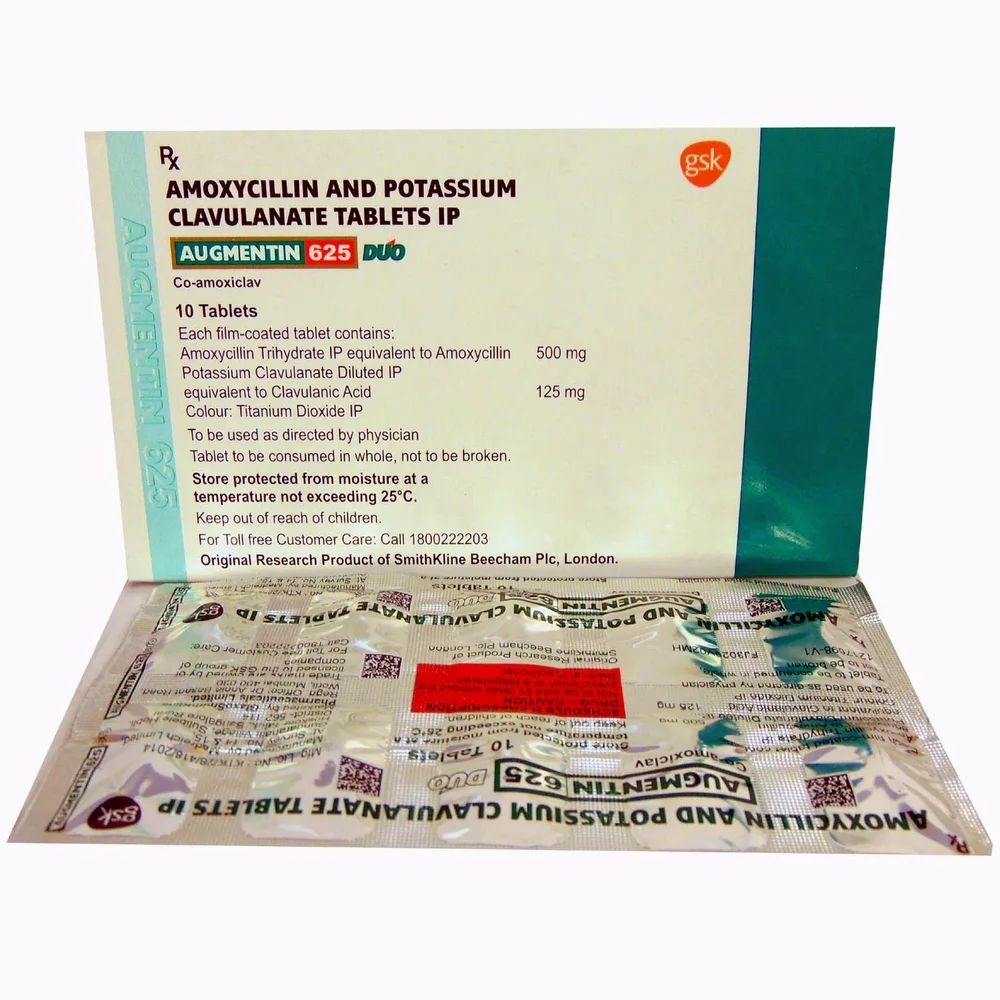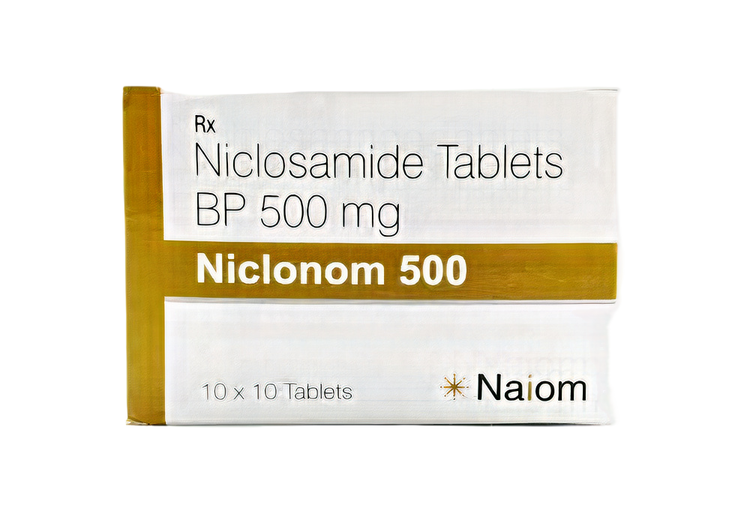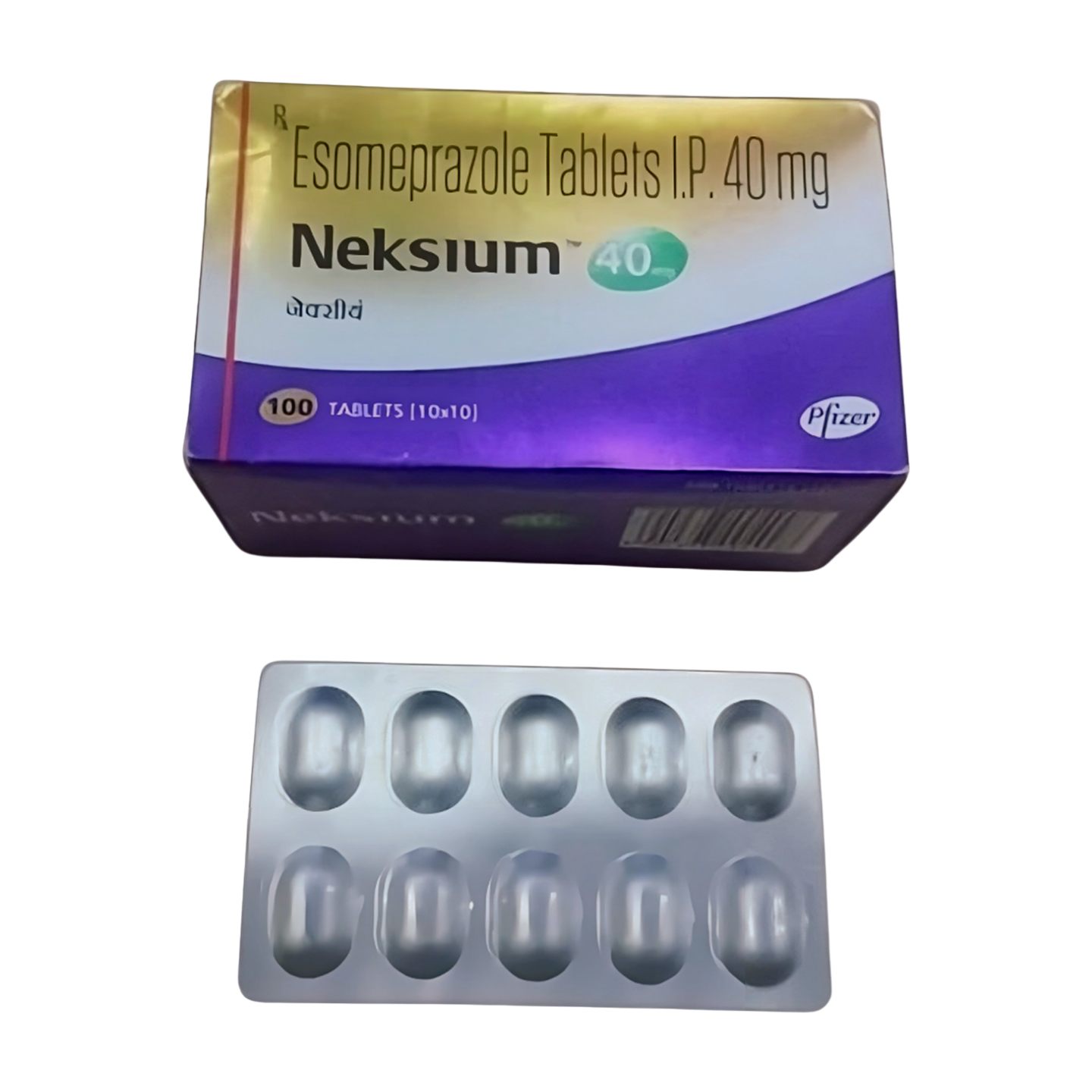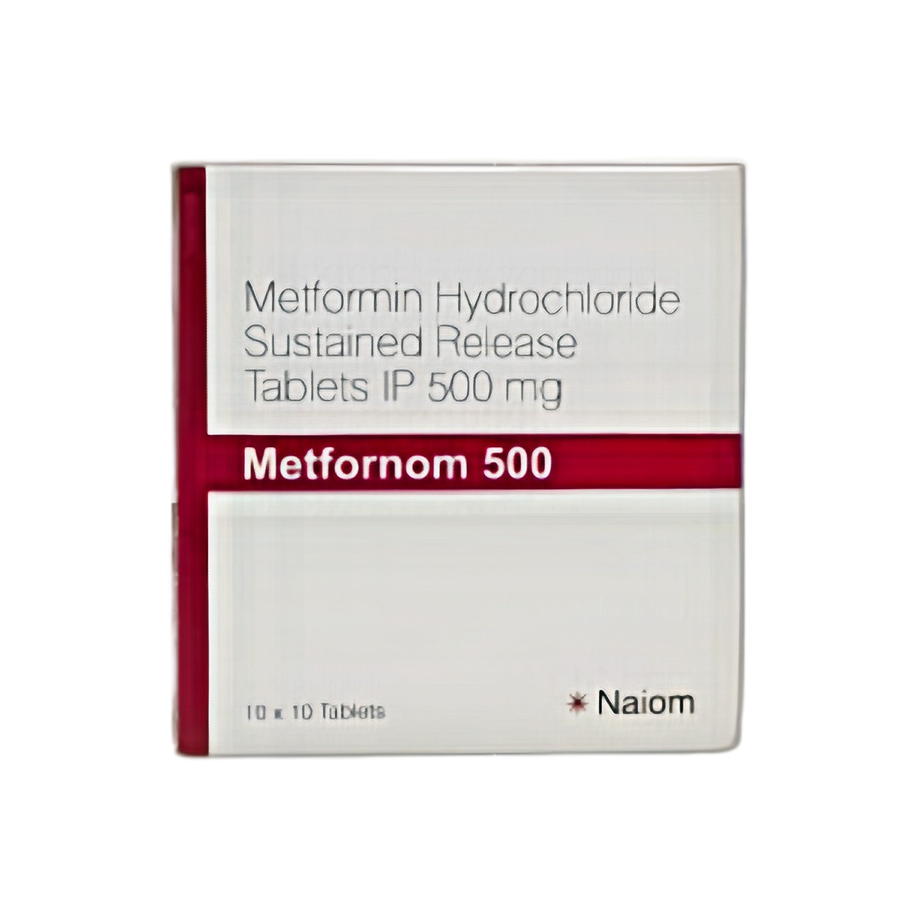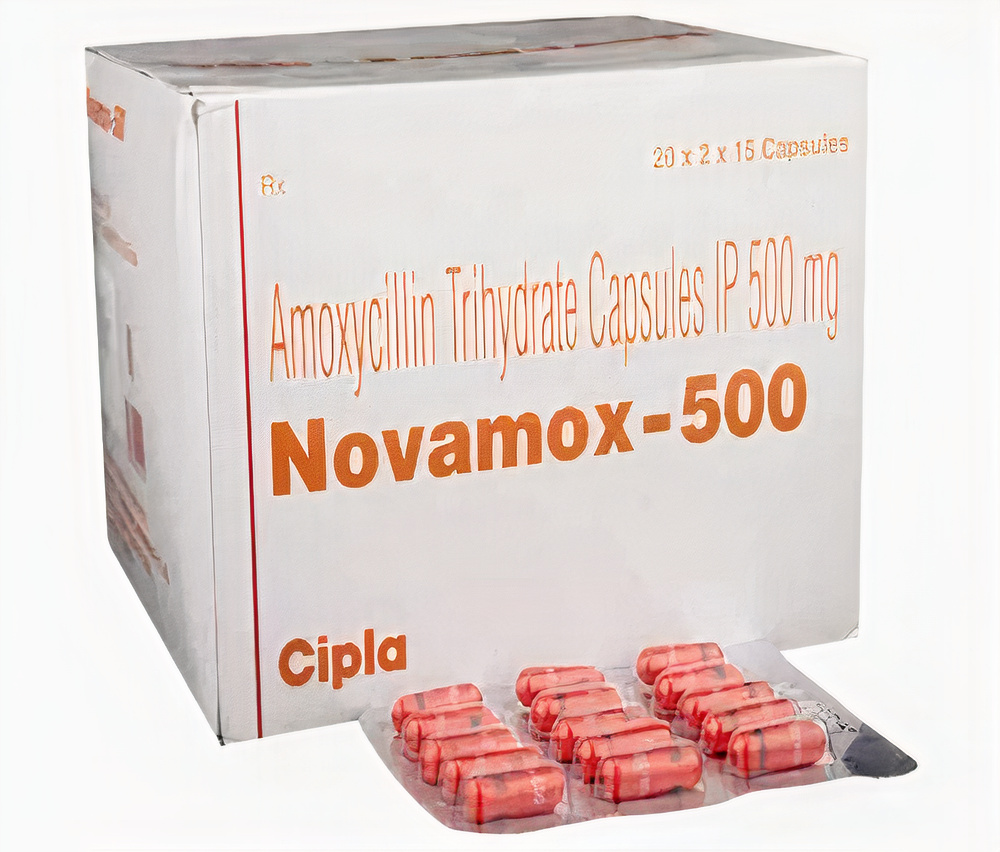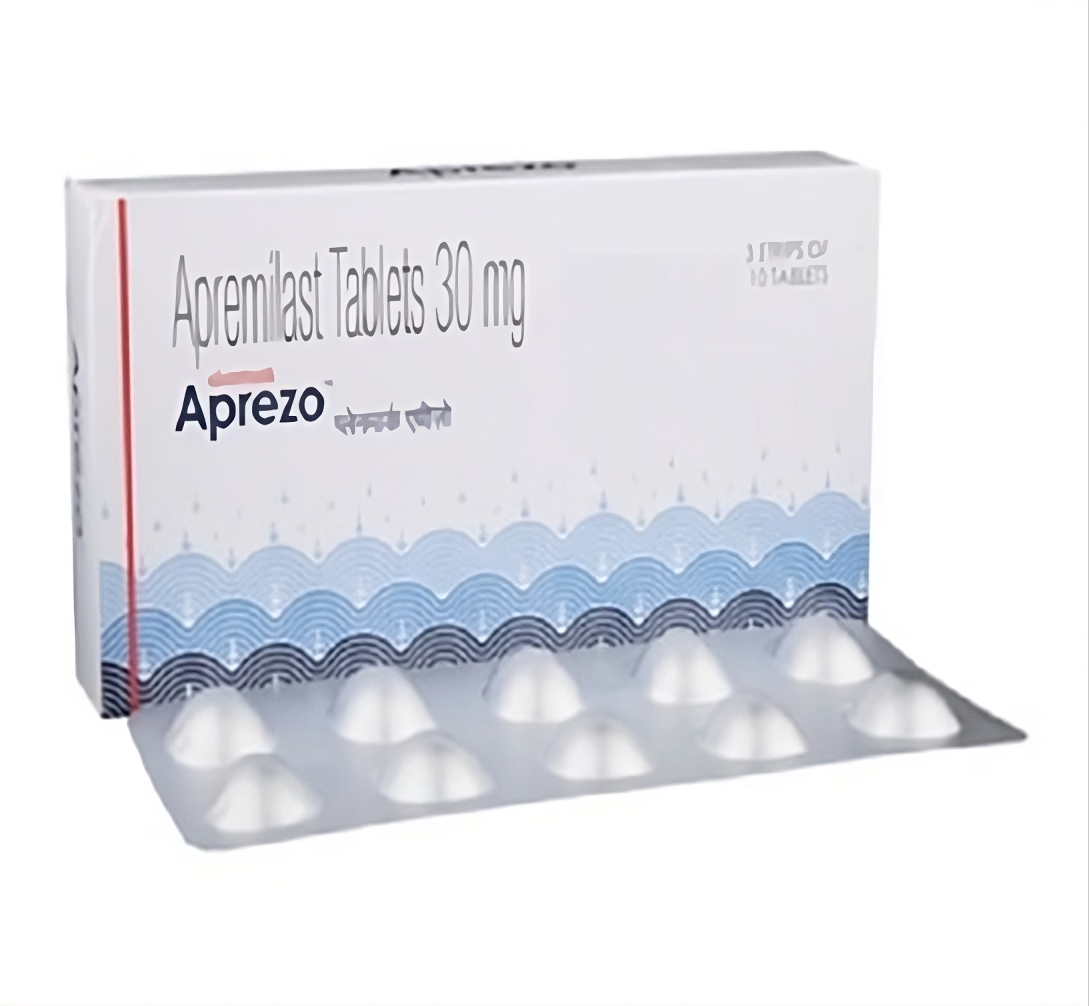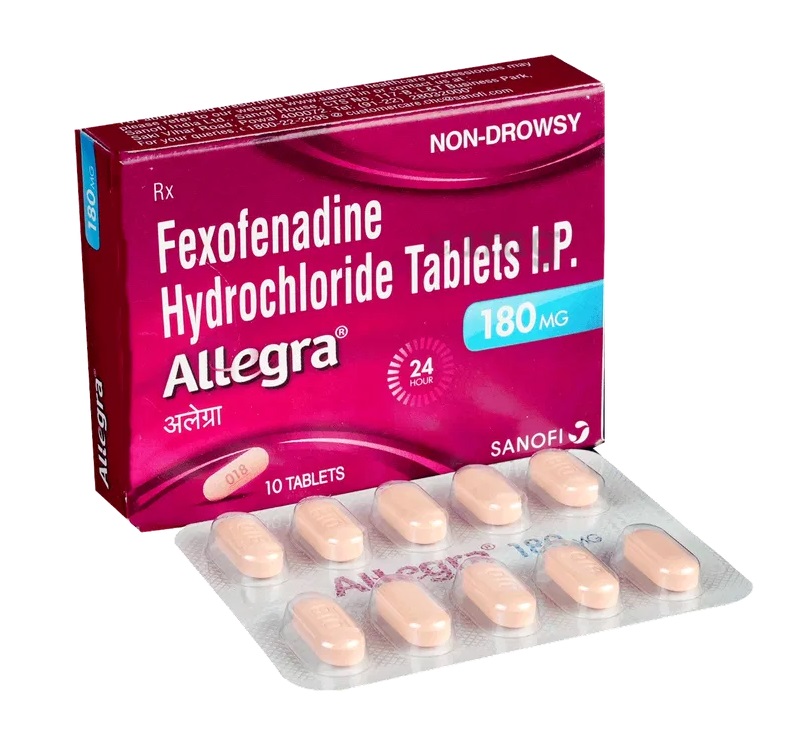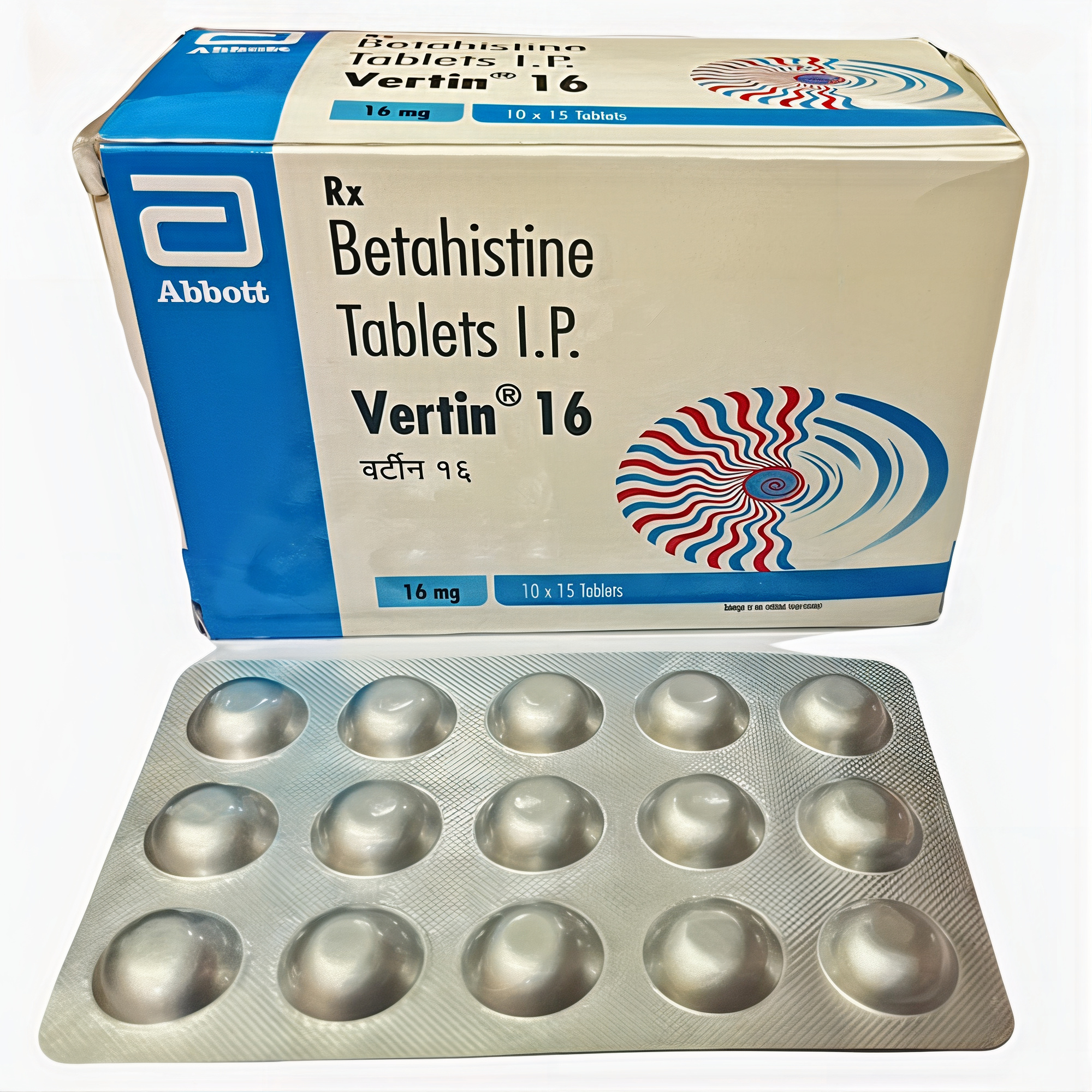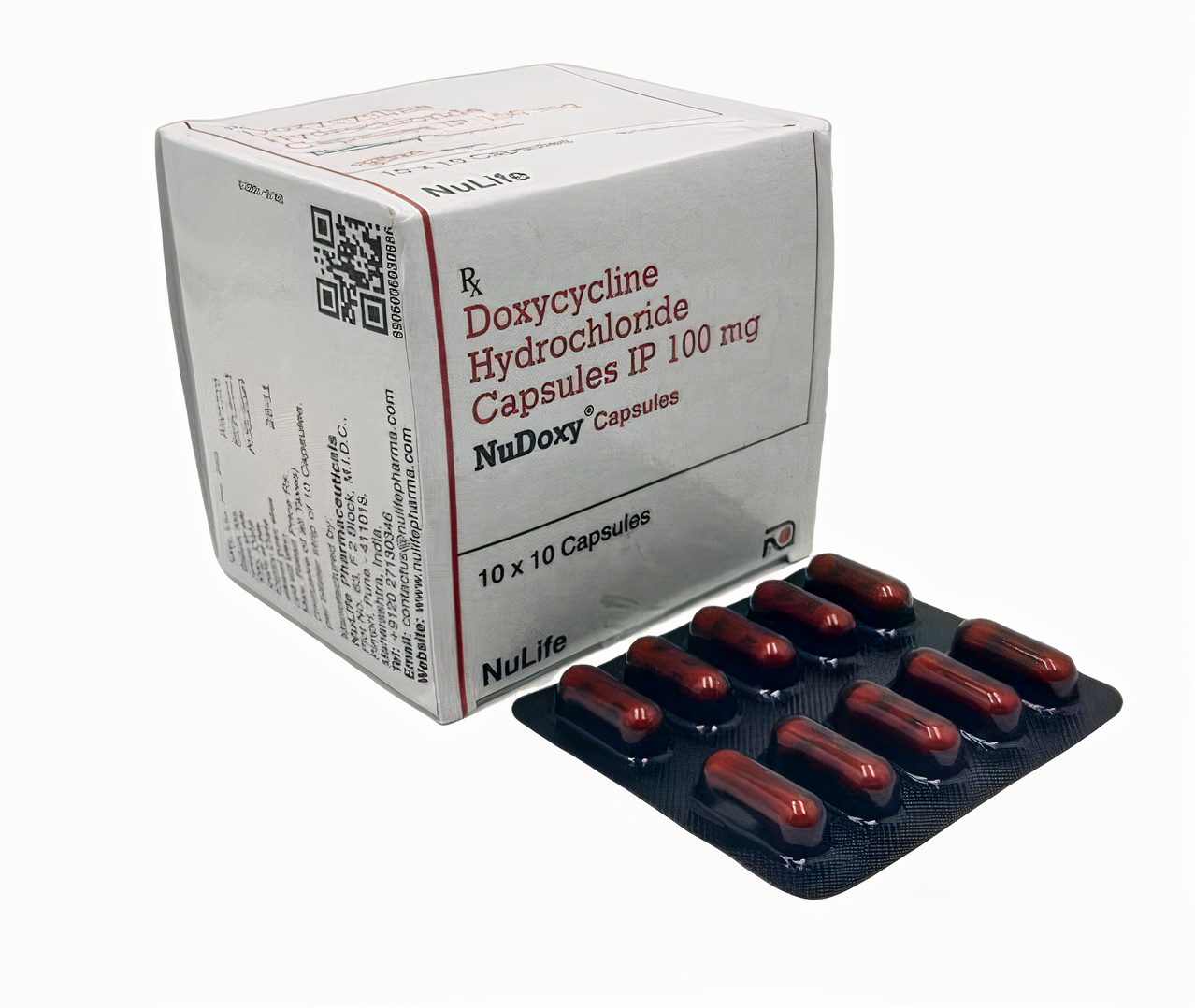Description
Augmentin 375 Tablet (Amoxycillin 250mg + Clavulanic Acid 125mg)
Augmentin 375 Tablet (Amoxycillin 250mg + Clavulanic Acid 125mg) is a powerful antibiotic designed to tackle various bacterial infections. Comprising two active ingredients, Amoxycillin and Clavulanic Acid, this medication effectively stops bacterial growth and enhances the antibiotic’s effectiveness against resistant strains. Its wide range of applications includes the treatment of infections affecting the lungs, ear, nasal sinus, urinary tract, skin, and soft tissues.
Uses Of Augmentin 375 Tablet (Amoxycillin 250mg + Clavulanic Acid 125mg)
- Treatment of lung infections
- Treatment of ear infections
- Treatment of nasal sinus infections
- Treatment of urinary tract infections
- Treatment of skin and soft tissue infections
Treatment of lung infections: Augmentin 375 Tablet is used to treat bacterial infections in the lungs such as pneumonia, helping to alleviate symptoms and clear the infection.
Treatment of ear infections: This medication is effective against bacterial ear infections, reducing pain and inflammation while eliminating the bacteria.
Treatment of nasal sinus infections: Augmentin 375 Tablet targets bacteria in the nasal sinuses, addressing infectious conditions like sinusitis and preventing complications.
Treatment of urinary tract infections: It combats bacterial infections in the urinary tract, alleviating symptoms such as pain and frequent urination.
Treatment of skin and soft tissue infections: Augmentin 375 Tablet helps treat bacterial infections in the skin and soft tissues, promoting faster healing and symptom relief.
Safety & Precautions
- Take Augmentin 375 Tablet with a meal to reduce stomach upset.
- Complete the full course as prescribed by your doctor.
- Avoid use if allergic to any antibiotics.
- Consult your doctor if you have kidney or liver problems.
- Inform your healthcare team about other medications you are taking.
- Monitor liver function tests regularly if on prolonged use.
- Safe during pregnancy if prescribed by a doctor.
- Generally safe during breastfeeding.
- May cause dizziness or fits; avoid driving if affected.
- Not recommended for patients with severe kidney disease.
Side Effects
Most side effects do not require any medical attention and disappear as your body adjusts to the medicine. Consult your doctor if they persist or if you’re worried about them.
- Mucocutaneous candidiasis
- Vomiting
- Nausea
- Diarrhea
- Allergic reactions
- Dizziness
- Rashes
- Stomach pain
- Indigestion
- Headache
- Fatigue
- Anemia
- Jaundice
- Sleep disturbances
- Kidney function disturbances
FAQ
Q: Can I consume alcohol while taking Augmentin 375 Tablet (Amoxycillin 250mg + Clavulanic Acid 125mg)?
A: Consuming alcohol with Augmentin 375 Tablet does not usually cause adverse side effects. However, it is generally advisable to consult your doctor regarding alcohol consumption while taking any medication to ensure there will be no interactions or additional stomach upset.
Q: What should I do if I miss a dose of Augmentin 375 Tablet (Amoxycillin 250mg + Clavulanic Acid 125mg)?
A: If you miss a dose of Augmentin 375 Tablet, take it as soon as you remember. If it is nearly time for your next dose, skip the missed dose and resume your regular schedule. Do not take a double dose to make up for the missed one. Consistency in dosing is key for effectiveness.
Q: Can Augmentin 375 Tablet be used to treat viral infections like the common cold?
A: No, Augmentin 375 Tablet is an antibiotic and is only effective against bacterial infections. It will not work for viral infections such as the common cold or flu. Using antibiotics when not needed can contribute to antibiotic resistance.
Q: Is Augmentin 375 Tablet (Amoxycillin 250mg + Clavulanic Acid 125mg) safe during pregnancy?
A: Augmentin 375 Tablet is generally considered safe to use during pregnancy if prescribed by a doctor. While animal studies have shown low or no adverse effects on the developing baby, human studies are limited. Always consult your healthcare provider before starting any new medication during pregnancy.
Q: Can I take Augmentin 375 Tablet (Amoxycillin 250mg + Clavulanic Acid 125mg) if I have kidney or liver disease?
A: If you have kidney or liver disease, you should use Augmentin 375 Tablet with caution. Dose adjustments may be required, and regular monitoring of kidney and liver function tests is recommended. Please consult your doctor for tailored advice.
Q: What should I do if I experience severe side effects while taking Augmentin 375 Tablet (Amoxycillin 250mg + Clavulanic Acid 125mg)?
A: If you experience severe side effects such as persistent vomiting, severe allergic reactions, jaundice, or difficulty breathing, seek immediate medical attention. Inform your doctor about any side effects, especially if they interfere with your daily activities or do not resolve on their own.
Additional Information on Augmentin 375 Tablet Amoxycillin (250mg) + Clavulanic Acid (125mg)
Dosage for Augmentin
AUGMENTIN 375 Tablet Amoxycillin (250mg) + Clavulanic Acid (125mg) may be taken without regard to meals; however, absorption of clavulanate potassium is enhanced when administered at the start of a meal. To minimize the potential for gastrointestinal intolerance, it should be taken at the start of a meal.
Adult Dosage
The usual adult dose is one 500-mg tablet of AUGMENTIN every 12 hours or one 250-mg tablet every 8 hours. For more severe infections and infections of the respiratory tract, the dose should be one 875-mg tablet every 12 hours or one 500-mg tablet every 8 hours.
- Adults who have difficulty swallowing may be given the 125 mg/5 mL or 250 mg/5 mL suspension in place of the 500-mg tablet.
- The 200 mg/5 mL or the 400 mg/5 mL suspension may be used in place of the 875-mg tablet.
- Two 250-mg tablets should NOT be substituted for one 500-mg tablet as they contain the same amount of clavulanic acid.
Pediatric Patients
Based on the amoxicillin component, dosing for AUGMENTIN 375 Tablet Amoxycillin (250mg) + Clavulanic Acid (125mg) should be as follows:
Neonates and Infants Aged < 12 Weeks (< 3 Months)
The recommended dose is 30 mg/kg/day divided every 12 hours, based on the amoxicillin component. Experience with the 200 mg/5 mL formulation in this age group is limited; thus, use of the 125 mg/5 mL oral suspension is recommended.
Patients Aged 12 Weeks (3 Months) and Older
The every 12-hour regimen is recommended as it is associated with significantly less diarrhea.
| Infection | Dosing Regimen Every 12 Hours | Dosing Regimen Every 8 Hours |
|---|---|---|
| Otitis media, sinusitis, lower respiratory tract infections, and more severe infections | 45 mg/kg/day | 40 mg/kg/day |
| Less severe infections | 25 mg/kg/day | 20 mg/kg/day |
Pediatric patients weighing 40 kg or more should be dosed according to adult recommendations. The 250-mg tablet of AUGMENTIN 375 Tablet Amoxycillin (250mg) + Clavulanic Acid (125mg) should not be used until the child weighs at least 40 kg.
Patients with Renal Impairment
Patients with impaired renal function do not generally require a reduction in dose unless the impairment is severe.
- For a glomerular filtration rate of less than 30 mL/min, 875 mg dose is not recommended.
- For a glomerular filtration rate of 10 to 30 mL/min, 500 mg or 250 mg every 12 hours should be administered.
- For a glomerular filtration rate of less than 10 mL/min, 500 mg or 250 mg every 24 hours should be administered.
Directions for Mixing Oral Suspension
Suspensions should be prepared at the time of dispensing. Here’s the reconstitution guide:
| Strength | Bottle Size | Amount of Water | Contents per 5 mL |
|---|---|---|---|
| 125 mg/5 mL | 75 mL, 100 mL, 150 mL | 67 mL, 90 mL, 134 mL respectively | 125 mg amoxicillin/ 31.25 mg clavulanic acid |
| 200 mg/5 mL | 50 mL, 75 mL, 100 mL | 50 mL, 75 mL, 95 mL respectively | 200 mg amoxicillin/ 28.5 mg clavulanic acid |
| 250 mg/5 mL | 75 mL, 100 mL, 150 mL | 65 mL, 87 mL, 130 mL respectively | 250 mg amoxicillin/ 62.5 mg clavulanic acid |
| 400 mg/5 mL | 50 mL, 75 mL, 100 mL | 50 mL, 70 mL, 90 mL respectively | 400 mg amoxicillin/ 57.0 mg clavulanic acid |
Note: Shake the suspension well before using. Reconstituted suspension must be stored under refrigeration and discarded after 10 days.
How Supplied
Dosage forms and strengths for AUGMENTIN 375 Tablet Amoxycillin (250mg) + Clavulanic Acid (125mg) are varied:
- Tablets available in 250 mg/125 mg, 500 mg/125 mg, and 875 mg/125 mg
- Powder for oral suspension in 125 mg/31.25 mg per 5 mL, 200 mg/28.5 mg per 5 mL, 250 mg/62.5 mg per 5 mL, and 400 mg/57 mg per 5 mL
- Chewable tablets available in 125 mg/31.25 mg, 200 mg/28.5 mg, 250 mg/62.5 mg, and 400 mg/57 mg
Storage and Handling
Store tablets and dry powder at or below 25°C (77°F). Store reconstituted suspension under refrigeration and discard unused suspension after 10 days. All forms should be dispensed in original containers to keep them out of reach of children.
Clinical Pharmacology
Mechanism of Action
AUGMENTIN 375 Tablet Amoxycillin (250mg) + Clavulanic Acid (125mg) works as an antibacterial drug thanks to its combination of amoxicillin and clavulanic acid. Amoxicillin provides the antibacterial activity, while clavulanic acid inhibits beta-lactamases that can deactivate amoxicillin.
Pharmacokinetics
Mean Amoxicillin and Clavulanate Potassium Pharmacokinetic Parameters with AUGMENTIN Tablets
| Dose and Regimen | Amoxicillin Cmax (mcg/mL) | Clavulanate Potassium Cmax (mcg/mL) | Amoxicillin AUC0-24 (mcg*h/mL) | Clavulanate Potassium AUC0-24 (mcg*h/mL) |
|---|---|---|---|---|
| 250/125 mg every 8 hours | 3.3 ± 1.12 | 1.5 ± 0.70 | 26.7 ± 4.56 | 12.6 ± 3.25 |
| 500/125 mg every 12 hours | 6.5 ± 1.41 | 1.8 ± 0.61 | 33.4 ± 6.76 | 8.6 ± 1.95 |
| 500/125 mg every 8 hours | 7.2 ± 2.26 | 2.4 ± 0.83 | 53.4 ± 8.87 | 15.7 ± 3.86 |
| 875/125 mg every 12 hours | 11.6 ± 2.78 | 2.2 ± 0.99 | 53.5 ± 12.31 | 10.2 ± 3.04 |
Mean Amoxicillin and Clavulanate Potassium Pharmacokinetic Parameters with AUGMENTIN Powder for Oral Suspension and Chewable Tablets
| Dose | Amoxicillin Cmax (mcg/mL) | Clavulanate Potassium Cmax (mcg/mL) | Amoxicillin AUC0-24 (mcg*h/mL) | Clavulanate Potassium AUC0-24 (mcg*h/mL) |
|---|---|---|---|---|
| 400/57 mg (5 mL of suspension) | 6.94 ± 1.24 | 1.10 ± 0.42 | 17.29 ± 2.28 | 2.34 ± 0.94 |
| 400/57 mg (1 chewable tablet) | 6.67 ± 1.37 | 1.03 ± 0.33 | 17.24 ± 2.64 | 2.17 ± 0.73 |
Absorption
Dosing in the fasted or fed state has a minimal effect on the pharmacokinetics of amoxicillin. The absorption of clavulanate potassium when taken with food is, however, greater. In one study, the relative bioavailability of clavulanate was reduced when AUGMENTIN was dosed at 30 and 150 minutes after the start of a high-fat breakfast.
Distribution
Neither component in AUGMENTIN is highly protein-bound; clavulanic acid is approximately 25% bound to human serum and amoxicillin is approximately 18% bound. Amoxicillin diffuses readily into most body tissues and fluids except the brain and spinal fluid.
Metabolism and Excretion
The half-life of amoxicillin after the oral administration of AUGMENTIN is 1.3 hours and that of clavulanic acid is 1 hour. Approximately 50% to 70% of the amoxicillin and approximately 25% to 40% of the clavulanic acid are excreted unchanged in urine during the first 6 hours after administration.
Microbiology
AUGMENTIN 375 Tablet Amoxycillin (250mg) + Clavulanic Acid (125mg) protects amoxicillin from degradation by some beta-lactamase enzymes, thereby extending its spectrum to include many bacteria normally resistant to amoxicillin. The drug is active against most isolates of:
Gram-positive Bacteria
- Staphylococcus aureus
- Enterococcus faecalis
- Staphylococcus epidermidis
- Staphylococcus saprophyticus
- Streptococcus pneumoniae
- Streptococcus pyogenes
- Viridans group Streptococcus
Gram-negative Bacteria
- Enterobacter species
- Escherichia coli
- Haemophilus influenza
- Klebsiella species
- Moraxella catarrhalis
- Proteus mirabilis
Anaerobic Bacteria
- Bacteroides species including Bacteroides fragilis
- Fusobacterium species
- Peptostreptococcus species
Susceptibility Test Methods
When available, the clinical microbiology laboratory should provide in vitro susceptibility test results for the antimicrobial drug products used in resident hospitals. This information helps the physician in selecting an antibacterial drug product for treatment.
Clinical Studies
Lower Respiratory Tract and Complicated Urinary Tract Infections
Data from two pivotal trials treated 1,191 patients for lower respiratory tract infections or complicated urinary tract infections. A regimen of 875 mg tablets every 12 hours was compared to 500 mg tablets every 8 hours, demonstrating comparable efficacy between both dosing regimens.
| Time Post Therapy | 875 mg every 12 hours (%) | 500 mg every 8 hours (%) |
|---|---|---|
| 2 to 4 days | 81% (58) | 80% (54) |
| 5 to 9 days | 58% (41) | 52% (52) |
| 2 to 4 weeks | 52% (101) | 55% (104) |
Acute Bacterial Otitis Media and Diarrhea in Pediatric Patients
A study compared 45/6.4 mg/kg/day of AUGMENTIN for 10 days taken every 12 hours versus 40/10 mg/kg/day every 8 hours in the treatment of acute otitis media. The study included 575 pediatric patients aged 2 months to 12 years.
| Evaluation | 45 mg/kg/day every 12 hours (%) | 40 mg/kg/day every 8 hours (%) |
|---|---|---|
| End of Therapy | 87% (265) | 82% (260) |
| Follow-up | 67% (249) | 69% (243) |
Patient Information
Patients should be informed that AUGMENTIN may be taken every 8 hours or every 12 hours, depending on the dose prescribed, and always should be taken with a meal or snack to reduce the possibility of gastrointestinal upset.
- Inform patients that antibacterial drugs, including AUGMENTIN, should only be used to treat bacterial infections.
- Ensure patients understand the importance of taking the medication exactly as directed and to complete the full course of therapy.
- Counsel patients to monitor for diarrhea and contact a physician if severe diarrhea develops.
- Advise patients to refrigerate the oral suspension and to use a dosing spoon or medicine dropper for administration, rinsing these tools after each use.
References
- Swanson-Biearman B, Dean BS, Lopez G, Krenzelok EP. The effects of penicillin and cephalosporin ingestions in children less than six years of age. Vet Hum Toxicol. 1988;30:66-67.
- Clinical and Laboratory Standards Institute (CLSI). Methods for Dilution Antimicrobial Susceptibility Tests for Bacteria that Grow Aerobically; Approved Standard – 8th ed. CLSI Document M7-A9. CLSI, Wayne, PA, 2012.
- CLSI. Performance Standards for Antimicrobial Susceptibility Testing: 22nd Informational Supplement. CLSI document M100-S22. CLSI, Wayne, PA, 2012.

